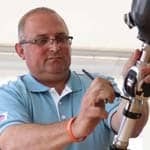Deep Dive: Prescriptive powerchair providers and the pandemic
After all the disruption of the second quarter of 2020, providers of prescriptive powerchairs worked hard to get back on track in Q3 while trying to navigate the unknown waters of the ‘new normal’.
For many, the period would prove crucial ahead of an uncertain and difficult Q4, with signs of a resurgence rearing its head towards the end of Q3.
In mid-September, a panel of five specialist powerchair providers discussed the state of play in the segment, as well as shared their hopes for an uncertain fourth quarter and beyond.
The panel
Darren Macey
Kevin Atkins
Matt Mohr
Matthew James
Richard Holland-Oakes
Q2: Complex chair provision challenges
For many providers of prescriptive powerchairs, the second quarter of 2020 will be remembered as one of the most difficult and uncertain periods of their business’ history. Lockdown, shielding and a freeze of many NHS services turned the world of prescriptive powered wheelchairs upside-down.
Wheelchair services across the country saw staff redeployed and assessments delayed while 2.2 million vulnerable people – many of whom were wheelchair-users – shielded, leading to an unprecedented fall in demand.
The disruption resulted in unmatched challenges for dealers of complex equipment. Arguably, the most significant challenge was balancing the emergency needs of existing customers with the commercial realities of running a viable business during a period of low sales.
“Due to shielding, customers hadn’t been using their batteries so battery sales have now quadrupled and then some!” Darren Macey
Alongside this, powerchair providers had to move fast to adapt their operations during the pandemic. While many other retail sectors were closed, mobility retailers had to interpret rapidly evolving government guidance and apply it to their business to continue to help customers.
As a result, many safety measures that would later go on to form the government’s ‘COVID-19 Secure’ guidance, published at the end of May, were already fully embedded into dealers’ practices.
By June, the peak of the spring outbreak had passed and lockdown measures came to an end. This was closely followed with the end of shielding in July and August. However, after months of restrictions and with the risk of coronavirus still in the air, the world of powerchair provision had changed irrevocably.
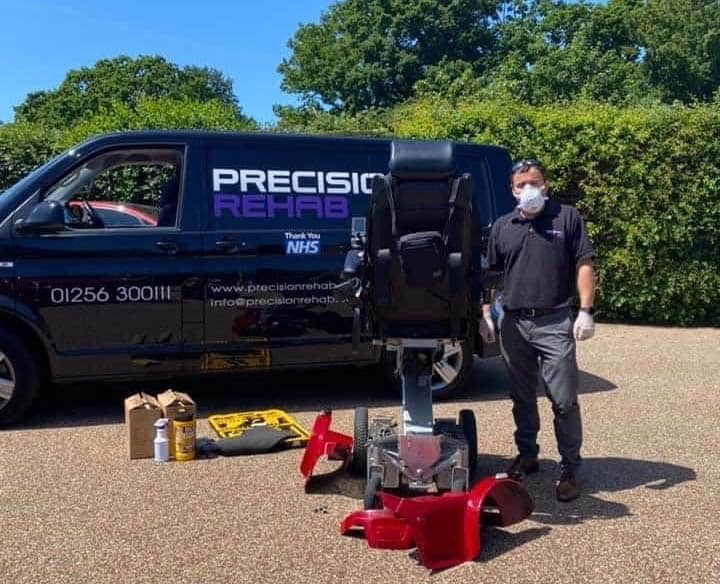
Q3: The road to recovery
Q3 marked the beginning of the ‘new normal’ as people began to adjust to living life during a pandemic.
Many in the sector had fingers crossed that the third quarter would also mark the return of demand after months of low enquiries and slow sales.
“We also received requests from clients that had NHS products and other suppliers’ products that they wanted us to visit as they were struggling to get them looked at.” Matthew James
Speaking with dealers, prayers for a strong recovery seemed to be answered as business leaders in the prescriptive wheelchair space reported strong levels of post-lockdown demand.
Matt Mohr, the newly-appointed Managing Director of South East-based Kent Mobility, explained that the company enjoyed an increase in enquires for assessments and servicing work since mid-June. Promisingly, the MD said some parts of the business reached ‘normal levels’ by September.
Mobility and rehabilitation specialist Recare also confirmed a strong post-lockdown recovery. Managing Director Richard Holland-Oakes noted that remaining operational throughout Q2 put the company in a good position to hit the ground running in Q3.
The promising rise in demand was also witnessed by wheelchair specialist Lifestyle & Mobility, stated Business Development Manager Darren Macey.
“We have definitely seen an increase in demand for normal prescriptive powerchairs, active wheelchairs and even scooters!” he said.
Darren attributed the recovery to its usual customers having more disposable cash available post-lockdown, having not had traditional expenses such as dining out and holidays to pay for.
“I believe that those who were shielding may have come out of this COVID situation with money in the bank,” he said.
“Most of those who were shielding saw their income stay the same and, in some cases, go up due to refunds of insurance policies, small grants etc.”
Interestingly, a specific area where activity was higher than usual for Lifestyle & Mobility was batteries, noted Darren, with lockdown inadvertently powering demand.
“Due to shielding, customers hadn’t been using their batteries so battery sales have now quadrupled and then some!” he added.
“It has come as no surprise though – let’s not forget the government specifically told our customers to shield and most of them have been doing so before lockdown even happened. And, as we all know, batteries love to be charged and discharged. So not only have our product sales increased, so has the service side of the business.”
The observation was seconded by Matthew James, Managing Director of Precision Rehab: “I would say we are now as busy as before the outbreak. Our service teams are now busy with annual services that were due between the outbreak and now, including battery replacements for clients keen to get out of the house again.”
The rise in activity was felt along the supply chain as the wheels of the prescriptive powerchair market began turning once again. Quantum Rehab, one of the leading suppliers in the complex powerchair space, reported an equally buoyant third quarter.
“Q3 has been a really busy period for Quantum in terms of high-end prescriptive powerchair orders,” confirmed Kevin Atkins, Senior Quantum Sales Manager.
“Motability opening up to new applications again also created extra orders for us.”
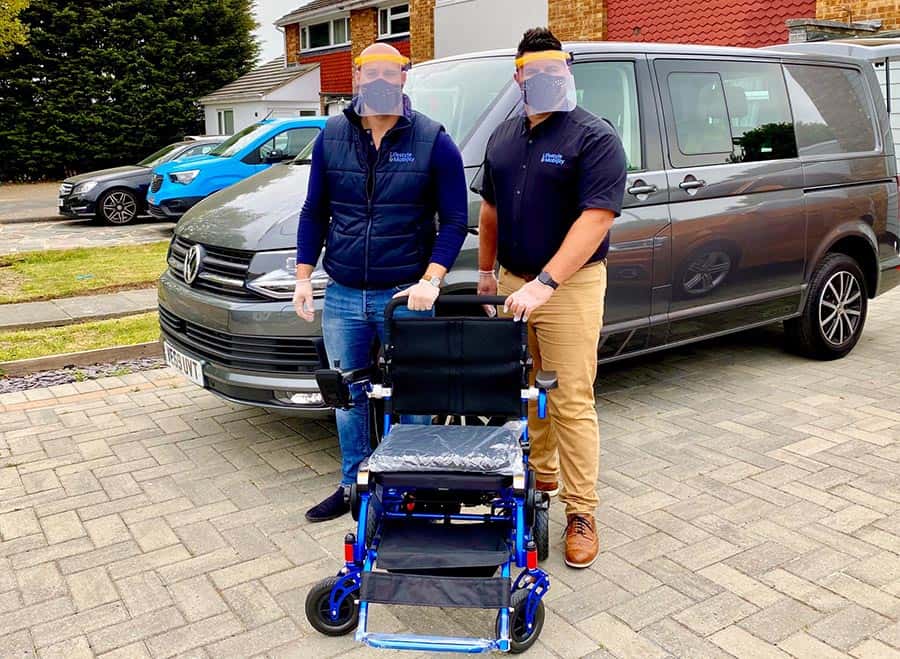
The impact of an NHS backlog
One of the most controversial messages issued to NHS leaders at the start of April was the recommendation to stop work deemed medium and lower priority relating to ‘wheelchairs, orthotics and prosthetics and equipment’ services. This was so resources could be redeployed throughout the health service to tackle the spiralling number of COVID-19 cases.
“Carrying out assessments is a little bit trickier with PPE on, especially in hot weather.” Matt Mohr
While many outsourced NHS wheelchair services providers continued to operate, many in-house services were forced to focus only on clients with emergency needs, resulting in a growing caseload of those with lower priority needs.
“We cannot applaud the NHS enough for their tireless help in these unprecedented times. There are, inevitably, extensive delays across the services they can offer though,” commented Recare’s Richard Holland-Oakes.
“The NHS Wheelchair Service has been able to see their emergency clients but many who do not meet the emergency criteria still need the equipment. Before the COVID-19 pandemic, the NHS was experiencing a significant delay for clients to receive equipment and this delay has now been extended, unfortunately, due to demand.”
At the time, the guidance came under criticism from figures in the mobility industry, warning of backlogs and concerns over people whose needs were deemed ‘medium risk’ escalating to ‘high risk’ during the freeze.
The situation led some to consider whether the growing NHS backlog might become a driver for wheelchair users to look for alternatives and potentially fuel demand in the private sector.
Several retailers, however, noted that this was less of a factor for the strong Q3 recovery experienced by many.
“We haven’t noticed any significant increase in demand due to the NHS backlog as yet,” confirmed Kent Mobility’s Matt Mohr.
Echoing his statement, Quantum’s Kevin Atkins noted: “When we came back after lockdown, we received a high level of orders. Some of these would have been backlog orders from the period just prior to lockdown but our data is telling us that a high number are new customers as well.
“I do not think, however, that any of these new orders have been caused by a delay within the NHS. From what I’ve seen, the NHS has continued to provide prescriptive powerchairs to the highest priority clients throughout the lockdown period.”
While the majority of providers did not attribute additional sales to NHS clients moving to private providers, Precision Rehab did report some examples of this happening.
“We had seen a build-up in service work, mainly routine maintenance (annual services). This was due to clients that were ‘shielding’,” explained Matthew.
“We also received requests from clients that had NHS products and other suppliers’ products that they wanted us to visit as they were struggling to get them looked at.”
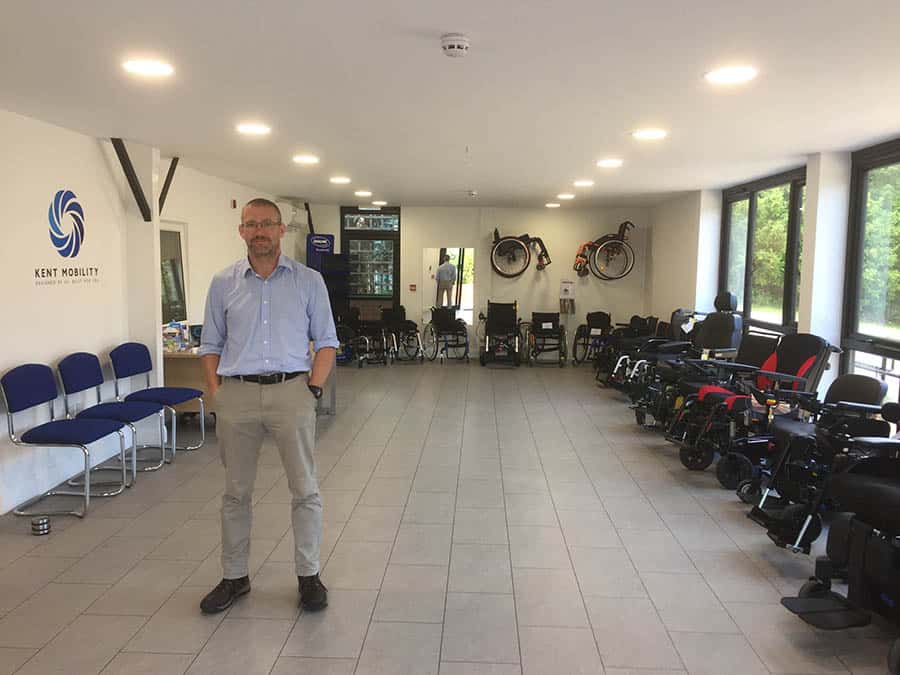
Adapting assessments
As mobility dealers adapted to the ‘new normal’, many had to find new ways of performing one of their most fundamental core services: assessments.
Since the start of the outbreak, conducting assessments had been one of the more difficult activities as dealers are often required to work face-to-face with clients and often within close proximity.
“With the NHS moving towards vouchers and products being purchased privately, it is inevitable that 2021 will see an increase from the outset due to the backlog of cases incurred.” Richard Holland-Oakes
It has required many to change how they perform assessments, with every dealer that THIIS spoke to universally highlighting the importance of personal protective equipment (PPE). As Kent Mobility’s Matt Mohr pointed out, however, wearing full PPE does not come without its challenges.
“Carrying out assessments is a little bit trickier with PPE on, especially in hot weather,” he commented.
“Gloves aren’t particularly helpful when using tools either.”
Alongside PPE, another common countermeasure introduced by dealers has been an increased cleaning regime, carefully and thoroughly cleaning all equipment before and after each assessment. All these additional steps have, inevitably, increased the time required to conduct assessments.
“The changes I’ve seen have been in the time it takes to plan and carry out an assessment,” reinforced Quantum Rehab’s Kevin.
“It definitely takes a little longer to organise, plus the actual assessment takes longer due to applying all of the PPE before entry. The same can be said for the handovers. Some dealers have also been working on an ‘appointment-only’ basis to help with planning and preparation.”
To help offset time lost, some retailers have introduced new procedures to streamline their assessment process.
“We have introduced a pre-assessment process, where we send our customer a form to fill in which asks for anatomical measurements, right-handed, left-handed, etc,” explained Lifestyle & Mobility’s Darren Macey.
“This helps us pre-set the chair up so we have less contact with the customer and spend less time in people’s homes.”
Gathering more information ahead of an assessment has also become a key element of Precision Rehab’s assessment practice, alongside offering a contactless option.
“We have changed the way we approach assessments by gathering as much information as possible prior to the assessment, usually by phone call or email questionnaire,” confirmed the company’s MD Matthew.
“This means we have reduced the actual assessment time and can focus on the client’s needs.
“By greatly reducing the length of any contact time at the assessment, the chance of infection is significantly reduced.”
Beyond being just temporary measures, Matt also highlighted these ‘new normal ways of working for Precision Rehab will continue long after the pandemic has passed.
“We will be keeping all these precautions in place until after the pandemic has passed as we see it as good practice,” he added.
With time of the essence for all businesses however, some providers will be keen to return to pre-pandemic ways of working.
“I think, given the choice, we were quite happy before the pandemic and will have no issue returning to “normal” assessments once the pandemic has passed,” commented Kent Mobility’s Matt.
The view was shared by Quantum Rehab’s Kevin, adding: “If the virus stays with us for a while, I imagine we will need to continue to allow more time for prep. If we are fortunate enough to get past this thing next year, I can see things mostly returning back to how they were before.
“The only thing I think we’ll see is more hand washing and antibac application than before, as this is becoming more normal. I think it will feel strange not using antibac in the future.”
Q4: An optimistic outlook
After a strong Q3 and a return of some semblance of normality over the warmer months, the panel could be forgiven for adopting a degree of optimism for what the fourth and final quarter of the year has in store.
Considering Q4 in mid-September, many dealers struck a positive tone while remaining wary of further coronavirus disruption.
“All indications show that we’ll continue to see an increase in demand for the remainder of 2020,” said Quantum’s Kevin.
“Of course, if we have a second wave, this may all change.”
Offering a similar prediction, Kent Mobility’s Matt Mohr added: “All things being equal and we don’t see the pandemic worsen and further government restrictions, we should see an increase in demand as customers confidence returns.”
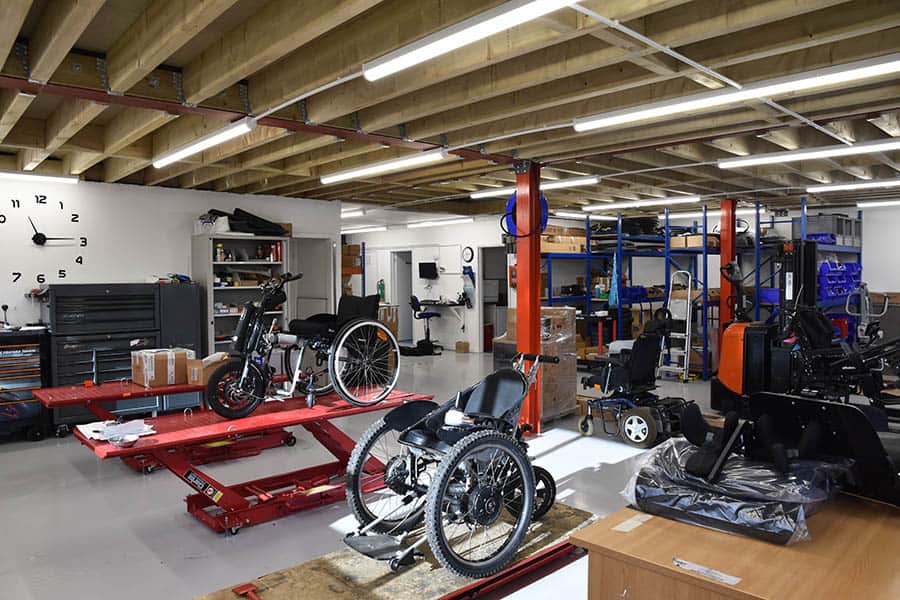
Recare also revealed high hopes for the end of the year. In particular, the retailer emphasised its plan to build on its investment into a new workshop and distribution facility in 2019 by signing more exclusive distribution deals.
“The business will continue to grow in the fourth quarter,” forecasted MD Richard Holland-Oakes.
“However, this is directly correlated to the government measures following an increase of COVID-19 cases in the UK. We are unable to predict what could change in the coming months reliably.”
After the last lockdown, players in the industry were all too aware that everything could be thrown up into the air very suddenly. As Q3 closed out, that seemed to very much be the case.
During the final weeks of September, rapidly rising cases of coronavirus required the government to implement new, stringent restrictions reminiscent of the spring. While it remains to be seen what this will mean for Q4, the industry and the nation are certainly better prepared to adapt, having lived with the virus for the past seven months.
2021: Staring into the unknown
What September proved is that the coronavirus situation can turn on a sixpence, making preparing for the weeks ahead seem impossible, let alone trying to work out what 2021 may have up its sleeve.
Discussing whether they believe 2021 would start strong or be a slow burner, the prescriptive provider panel cautiously gave their best guesses.
“It’s hard to say right now. If we get the second wave then who knows,” stated Quantum Rehab’s Kevin Atkins.
“If we manage to keep business moving throughout the remainder of 2020, then I think we’ll continue to see growth as we move into 2021.”
The view was matched by Kent Mobility’s Matt Mohr, adding: “It depends on what the winter brings in terms of the pandemic and the general state of the economy with the many anticipated redundancies.
“We also have Brexit approaching fast. It sounds gloomy but I think there is a chance it could start strong though.”
Sharing the retailer’s optimism, Precision Rehab’s Matthew James also hoped for a strong start to 2021. In particular, he highlighted the elasticity of demand for prescriptive powered mobility products, as well as the important role exhibitions play for providers in the sector.
“With products such as ours, clients often source funding and this means our order flow is fairly consistent,” he explained.
“It would be great to get back to some exhibitions as soon as it is safe to do so as this will hopefully give clients more confidence. Also, the industry as a whole generates a large percentage of assessments from exhibitions as they are a great way to initially showcase the product. Only having one event this year has certainly affected the 2020 results.”
This idea that powerchairs designed to meet more complex needs may be less susceptible to the economic impacts that may hit other sectors of retail hard was reaffirmed by Recare’s Richard.
“Fortunately, the industry is highly regarded as a necessity for most, rather than a want. Due to the complexity and skillset that Recare represents, we are fortunate that our consultancy and engineer services are something that is always going to be needed by the NHS, social services and the private clientele.
“With the NHS moving towards vouchers and products being purchased privately, it is inevitable that 2021 will see an increase from the outset due to the backlog of cases incurred.”
Having survived lockdown and thrived throughout the recovery, the confidence shared by the panel is a clear indication that 2020 has built a greater level of resilience and conviction among the players in the market.
“We are very optimistic, otherwise we wouldn’t be expanding and spending extra money on marketing etc,” finished Lifestyle & Mobility’s Darren Macey.
“I really do feel we shall still see a small increase as last year’s figures, as long as there not another full lockdown.”
With so much uncertainty for the weeks, months and potentially years ahead, one thing does seem certain: No matter what pandemic-disruption is to come, players in the mobility industry stand ready to overcome to ensure their essential services remain available to those in need.
https://thiis.co.uk/deep-dive-prescriptive-powerchair-providers-and-the-pandemic/https://thiis.co.uk/wp-content/uploads/2020/03/Edge-Stretto-Quantum-rehab.jpghttps://thiis.co.uk/wp-content/uploads/2020/03/Edge-Stretto-Quantum-rehab-150x150.jpgCoronavirus NewsCOVID-19 Trade NewsIndustry Deep DivesNewsroomRetailer NewsSupplier NewsTrade FocusTrade NewsAssessments,complex power chairs,contactless,coronavirus,COVID-19,Darren Macey,Kent Mobility,Kevin Atkins,Lifestyle & Mobility,lockdown,maintenance,Matt Mohr,Matthew James,NHS backlog,pandemic,powerchairs,PPE,Precision Rehab,prescriptive powerchairs,Quantum Rehab,Recare,repair,Richard Holland-Oakes,StrettoAfter all the disruption of the second quarter of 2020, providers of prescriptive powerchairs worked hard to get back on track in Q3 while trying to navigate the unknown waters of the ‘new normal’. For many, the period would prove crucial ahead of an uncertain and difficult Q4, with signs...Calvin BarnettCalvin Barnettcalvin.barnett@bhta.comAuthorTHIIS Magazine







